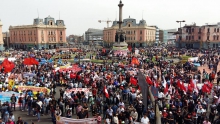In Peru, thousands of workers join a national strike against Humala’s neoliberal reforms

The national day of protest particularly affected the cities of Cusco, Huancayo, Arequipa, Trujillo and Chiclayo. CGTP workers in Chiclayo went so far as to crucify themselves before joining a march around the city centre.
“This is a resounding protest, we have blocked roads, burned effigies, crucified ourselves and called on all the working class to reject and repudiate the traitor Ollanta Humala’s government”, said CGTP leader, Wilmer Antón Mayanga.
In the capital, Lima, the presidential palace was guarded by a cordon of about 5,000 police officers, who blocked all streets leading to the seat of government.
Union leaders negotiated with the police, who allowed a group of demonstrators to approach the palace to deliver a document setting out their demands. The unions want an increase in the minimum living wage, which has remained at 750 new soles/month (about US$ 236) since 2012.
"We must remain united in calling on the government to increase wages; we are asking for a minimum wage of 1,500 new soles (about US$ 472)", Carmela Sifuentes, CGTP president told the press.
Public Services International (PSI) has expressed its solidarity with the CGTP and PSI affiliates in the country (FED-CUT, FENAOMP, FENTASE, FENTAP, FENTAT, FENTUP, FNTPJ, SUTREL), which have been actively participating in this trade union action.
In a statement on the national strike in Peru, the PSI emphasised that the national protest by the trade union movement and social movements was in response to the mistaken economic policy and neoliberal reforms of the state implemented by Ollanta Humala Tasso’s government, which threaten labour rights and deepen the economic and political crisis for the vast majority of citizens.
The PSI requests the government to find a way to resolve the crisis and accept the trade union demands.
1. General pay rise.
2. Promulgation of a General Labour Law that adopts International Labour Organisation (ILO) standards.
3. No privatisation of water companies and repeal of Law 30045.
4. No privatisation and no public-private partnerships for strategic companies and public services.
5. Defence of social security and its autonomy.
6. Repeal and reform of the articles of the Public Service Law that make public sector employment precarious; implementation of ILO Convention 151.
7. Repeal of laws that make employment precarious.
8. Respect for the right to collective bargaining and freedom of association.
9. Support for farmers and their struggle for land, water and food sovereignty.
10. Introduction of mechanisms to eradicate corruption and fight impunity.

